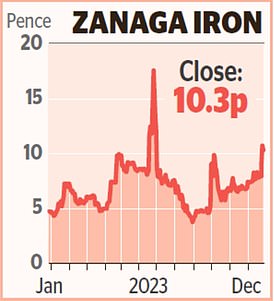British defence giant BAE Systems was one of the biggest FTSE 100 risers yesterday as the industry was boosted by geopolitical tensions.
On a quiet day for the London market, BAE’s share price rose 0.6 per cent, or 6.5p, to 1,102p after a report revealed its order book had jumped around £7billion in a year.
Heightened global hostilities and ongoing conflicts have increased defence spending.
The order books of the world’s biggest defence companies have been pushed to near record highs and the MSCI’s global benchmark for the industry’s stocks is up 25 per cent over the past 12 months.
The war in Ukraine partly explains the increase but firms such as BAE Systems have also been buoyed by new orders for existing contracts.

Boosted: On a quiet day for the London market, BAE’s share price rose 1.1% after a report revealed its order book had jumped around £7bn in a year
The report revealed that BAE’s order backlog rose from £48.5billion to £55.5billion in 2022. And orders hit a record £66billion in the first half of this year.
Meanwhile mining stocks also rose after copper prices jumped 1.36 per cent to 8,690.5p yesterday.
Anglo American’s share price rose 0.5 per cent, or 9p, to 1,984.8p while Antofagasta was down 0.2 per cent, or 3p, at 1,707.5p.
Glencore’s share price fell 0.4 per cent, or 1.7p, to 470.1p. Rio Tinto’s stock surged 0.6 per cent, or 35p, to 5,860p.
Other risers included AstraZeneca, which continued to gain off the back of a £950million deal to buy Shanghai pharmaceutical company Gracell Biotechnology, which was announced on Boxing Day.
The drugmaker’s share price jumped 0.4 per cent, or 46p, to 10,574p, with rival pharma giant GSK also up 0.8 per cent, or 11.6p, to 1,461.2p.
The FTSE 100 index of blue-chip stocks was down 0.03 per cent, or 2.2 points, at 7,722.74p, while the midcap FTSE 250 index fell 0.01 per cent, or 1.6 points, to 19,719.16.
On Wall Street, the Dow Jones rose 0.2 per cent, while the S&P 500 also ticked up 0.2 per cent and the Nasdaq gained 0.3 per cent.
Meanwhile, the pound was trading at $1.276 against the dollar.
Oil prices dropped around 1 per cent after sliding almost 2 per cent the previous day as major shipping firms began returning to the Red Sea.
Danish company Maersk said it has scheduled container vessels to travel via the Suez Canal and Red Sea.
It had called a temporary halt this month following attacks by Yemen’s Iran-backed Houthi militia.
The move to reinstate the route has ‘helped dispel some immediate concerns about supply issues’, Susannah Streeter, head of money and markets at Hargreaves Lansdown, said.
Shell’s share price dipped 0.3 per cent, or 7p, to 2,549p. BP’s stock dropped 0.4 per cent, or 2p, to 465p on lower oil prices.
‘The market is likely to try the upside again… maybe in the early new year, on expectations of a recovery in fuel demand thanks to monetary easing in the United States,’ said Hiroyuki Kikukawa, of NS Trading, a unit of Nissan Securities.
UK housebuilder stocks fell on fears the Bank of England will be slow to cut interest rates in 2024.
A cautious approach would keep mortgage costs higher for longer.
Barratt Developments’ share price fell 0.7 per cent, or 4p, to 562.4p, Land Securities’ stock dropped 1 per cent, or 7.2p, to 716.4p and Berkeley tumbled 0.4 per cent, or 20p, to 4,737p.
Streeter said: ‘Housebuilders are on the back foot amid signs that consumers are still showing signs of resilience in their spending patterns in the post-Christmas sales.
‘The Bank of England is showing more wariness than the Fed about the trajectory for inflation, so any sign that interest rates might stay higher for longer in the UK aren’t read well for the housing market.’
On London’s AIM market, the biggest faller was chipmaker Sondrel. Shares plunged 53.7 per cent after a £1.7million contract delay sparked cashflow issues.
Some links in this article may be affiliate links. If you click on them we may earn a small commission. That helps us fund This Is Money, and keep it free to use. We do not write articles to promote products. We do not allow any commercial relationship to affect our editorial independence.




